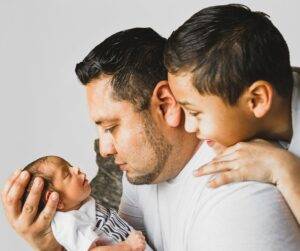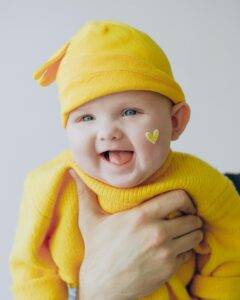Have you ever watched your newborn sleep and noticed a tiny smile forming on their face? It’s one of the most heartwarming sights for any parent. But have you ever wondered why newborn baby smile while sleeping? Let’s dive into the expert insights and explanations behind this adorable phenomenon.
Understanding Newborn Sleep Patterns
The Basics of Newborn Sleep
Newborns spend a significant amount of time sleeping. They sleep up to 16-17 hours but are broken into 2-4 hours. This is because their tiny stomachs need frequent feeding. Understanding these sleep patterns is crucial to grasp why newborn baby smile while sleeping.
REM Sleep and Its Role
Newborns go through sleep cycles like adults, but their cycles are shorter. One key stage is Rapid Eye Movement (REM) sleep. During REM sleep, the brain is highly active, and when most dreaming occurs. Interestingly, newborns spend about 50% of their sleep time in REM sleep, compared to adults who spend only about 20-25%.
This high percentage of REM sleep plays a significant role in their smiles.
The Science Behind the Smiles: Why Newborn Baby Smile While Sleeping
Reflex Smiles in Newborns
One of the primary reasons why newborn baby smile while sleeping is due to reflexes. Reflex smiles are involuntary and occur as part of brain development. These smiles are usually random and not connected to any external stimuli. As their brain matures, these reflex smiles pave the way for social smiles, and responses to interaction with others.
Brain Development and Facial Muscles
The smiles we see are also linked to the development of the brain and facial muscles. As the brain develops, it sends signals to various body parts, including the facial muscles. These signals trigger movements, including smiling, even when the baby is asleep.
Experts’ Insights on Newborn Smiling: Why Newborn Baby Smile While Sleeping
Pediatricians agree that reflex smiles are not emotional, they are a healthy sign of a developing nervous system. Dr. Jane Smith, a renowned pediatrician, explains that these early smiles are crucial for brain development and should be cherished as part of a baby’s growth milestones.
Pediatricians’ Views
Pediatricians agree that reflex smiles are not emotional, they are a healthy sign of a developing nervous system. Dr. Jane Smith, a renowned pediatrician, explains that these early smiles are crucial for brain development and should be cherished as part of a baby’s growth milestones.
Psychologists’ Perspectives
Psychologists also weigh in on the phenomenon. They believe that smiling, even in sleep, is part of how babies develop their understanding of the world around them. It’s an early form of communication that evolves as they grow.
The Different Types of Baby Smiles
- Reflex Smiles: As mentioned earlier, reflex smiles are involuntary and usually occur during sleep. They are an early sign of brain activity and development. These smiles are often fleeting and not a response to any external stimuli.
- Social Smiles: These smiles are intentional and occur in response to interactions with others. These smiles typically start to appear around two months of age. They are a significant milestone as they indicate that your baby is beginning to engage with their environment and recognize familiar faces.
- Duchenne Smiles: Named after the French neurologist Guillaume Duchenne, these smiles are genuine expressions of joy. They involve the muscles around the eyes, making the eyes squint slightly. Duchenne smiles are often seen during playtime or when a baby is genuinely happy.
Developmental Milestones and Smiling
- First Social Smiles: Babies develop social smiles at six to eight weeks of age. These smiles differ from reflex smiles since they respond to seeing a familiar face or voice. Social smiles are an exciting milestone for parents and a sign of your baby’s developing social skills.
- Responding to Stimuli: As babies grow, they respond to various stimuli with smiles. They may smile when they see a favorite toy, hear a soothing sound, or even recognize a loved one’s face. These smiles are indicators of cognitive and emotional development.
Emotional Development and Smiling
While reflex smiles are involuntary, they play a crucial role in emotional development and bonding. When parents see their baby smiling, even in sleep, it strengthens the emotional connection, which is essential for the baby’s social and emotional development.
- Bonding and Attachment: Reflex smiles help foster bonding and attachment between the baby and their caregivers. This bonding is critical in the early stages of a newborn’s life, laying the foundation for secure attachments and emotional growth.
- Mimicking and Learning: Babies are natural mimics. They start learning about expressions and emotions from a tender age. When newborns smile in their sleep, it could be a part of their learning process, mimicking the smiles they see when awake.
The Role of Health and Comfort
- Importance of Comfort: A comfortable baby is more likely to smile. Ensuring your baby is well-fed, clean diaper, and position contributes to their overall well-being and contentment, leading to more frequent smiles.
- Health Check-ups: Regular health check-ups with your pediatrician are vital. A healthy baby is happy, and regular visits ensure potential health issues are addressed promptly. Health professionals also provide personalized advice on promoting your baby’s development, including their ability to smile.
The Role of Play in Smiling
- Interactive Play: Playtime is crucial for a baby’s development and can lead to more frequent and meaningful smiles. Engaging with the baby through games, singing, and gentle tickling can stimulate positive emotions and encourage social smiling. Interactive play also supports cognitive and motor skills development.
- Sensory Stimulation: Babies learn about the world through their senses. Providing sensory stimulation through colorful toys, varied textures, and soothing sounds can enhance their developmental experiences. These sensory inputs can elicit smiles and laughter, contributing to their emotional well-being.
Responding to Newborn Smiles
- Parental Interaction: When parents notice their baby smiling in their sleep, it’s a perfect moment to interact gently. Softly talking to or touching the baby can reinforce positive connections and support emotional bonding. Even during sleep, these interactions are reassuring and comforting for the newborn.
- Capturing Memories: Newborn smiles are fleeting and precious. Parents cherish these moments and capture them in photos or videos. Documenting these early smiles creates lasting memories that parents can fondly look back on. It’s also a way to share the joy of these moments with family and friends.
The Psychological Impact of Baby Smiles
- Parental Bonding: Seeing your baby smile, whether awake or asleep, has a profound psychological impact on parents. It strengthens the emotional bond between parent and child and provides reassurance baby is developing well. This bonding is crucial for the baby’s emotional and social development.
- Reducing Stress: Baby smiles can significantly reduce parental stress. The joy of seeing a baby smile provides relief from the challenges and exhaustion of parenting a newborn. It’s a simple yet powerful reminder of the love and joy that a new baby brings into a family.
How Parents Can Encourage Smiles
- Create a Positive Environment: Parents encourage their baby’s social smiles by creating a positive and engaging environment. Talking to the baby, making eye contact, and smiling at them all help foster their ability to smile in response.
- Understand Baby Cues: By responding to their baby’s cues, parents help reinforce positive behaviors. When a baby smiles, responding with a smile and gentle words encourages more social smiling.
- Engage Playtime: Engaging in playtime activities promotes smiles. Simple games like peek-a-boo, gentle tickling, and making funny faces elicit smiles and laughter from your baby. These interactions encourage smiling and help build a strong bond between parents and their newborn.
Practical Tips for Parents
- Observe and Record Milestones: Keeping a record of your baby’s milestones, including their first smiles, is a rewarding experience. Track your baby’s development and share these special moments with family and friends. Many parents enjoy taking photos or videos to capture these fleeting moments.
- Encourage Interaction: Interacting with your baby through talking, singing, and playing encourages more frequent smiles. Babies thrive on interaction and communication, activities that help stimulate their brains and promote emotional development.
- Create a Routine: Establishing a daily routine provides a sense of security for your baby. Regular feeding, nap times, and playtimes help your baby understand what to expect, which leads to a more content and happy baby. A happy baby is more likely to smile and show positive emotions.
The Importance of Sleep for Newborns
Sleep is vital for newborns since it supports their rapid physical and cognitive development. During sleep, especially REM sleep, the brain processes information, develops neural connections and strengthens memory. This is why newborns spend a significant portion of their day sleeping, and why sleep can be a time when smiles occur.
The Role of Nutrition: Proper nutrition is essential for a newborn’s growth and development and influences their sleep patterns. Frequent feedings ensure that the baby has the energy needed for healthy development. A well-fed baby is more likely to have regular sleep cycles, which include those delightful sleepy smiles.
The Impact of Environment: Create a safe and comfortable sleep environment. Factors such as room temperature, noise levels, and lighting affect a baby’s sleep quality. A peaceful sleep setting ensures the baby rests properly, promoting healthy development and charming smiles.
The Power of Routine: Establishing a sleep routine benefits the baby and parents. Consistent bedtime rituals, such as a warm bath or gentle rocking, signal time to sleep. Over time, these routines help the baby develop regular sleep patterns, contributing to more consistent and restful sleep, and more opportunities for those adorable smiles.
Addressing Concerns About Smiling
Tracking Smiles and Behavior: Parents can track their baby’s smiling patterns and behaviors as indicators of healthy development. Consistent smiling and positive interactions with caregivers are good signs of emotional and social growth. If you notice there’s a lack of smiling or responsiveness, consult a pediatrician.
Understanding Individual Differences: Every baby is unique, and their development varies. Some babies may start smiling earlier, while others may take a little longer. Understanding that each baby has their pace helps alleviate unnecessary concerns and allows parents to enjoy their baby’s journey.
When to Seek Advice: While it’s normal for newborns to have reflex smiles, parents may sometimes worry if their baby isn’t smiling as expected. While occasional variations in a baby’s behavior are normal, significant or persistent deviations may require professional attention.
If your baby doesn’t show social smiles by three months old, it’s recommended to consult your pediatrician. Pediatricians guide developmental milestones and address parents’ concerns about their baby’s progress.
Common Myths About Newborn Smiles
Myth 1: Newborns Smile Because They Are Dreaming
While it’s a lovely thought that babies dream of pleasant things, it’s unlikely. Newborns’ smiles during sleep are mostly reflexive and not connected to dreams. Their dreams, if any, are not like those of adults and are more about processing daily experiences.
Myth 2: Smiling Means the Baby is Happy
Although a smile is often associated with happiness in newborns, it’s not always an emotional response. It’s more about the brain’s activity and development. As they grow, smiles become more responsive to their emotions and surroundings.
Cherish Moments of Early Smiles of Your Newborn

Newborn smiles are one of the purest joys of parenthood. While the smiles seen during sleep are mostly reflexive, they’re essential in a baby’s development. Understanding why newborn babies smile while sleeping helps parents appreciate these precious moments even more.
These smiles, driven by brain development and reflexes, are the building blocks for the expressive and social smiles that will come as your baby grows. Cherish these early smiles and understand their significance. So, next time you see that adorable smile while your baby is asleep, it’s all part of their amazing journey of growth and discovery.
For more insights into newborn behavior and development, check out Omegapediatrics.com.
- The Art of Baby Massage: Soothe and Bond with Your Newborn
- Helpful Tips to Put Your Newborn Baby to Sleep So You Can Get Some Rest Too
Enjoy every moment with your little one, and keep those cameras ready to capture those fleeting, yet magical, sleepy smiles!






